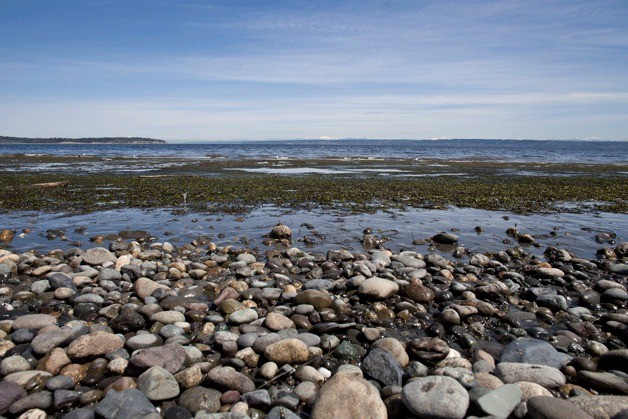A coalition of environmental organizations is challenging the city of Bainbridge Island’s new Shoreline Management Program, and claims the updated rules open up the entire shoreline of Bainbridge to aquaculture.
The groups — Bainbridge Alliance for Puget Sound, Association of Bainbridge Communities and Coalition to Protect Puget Sound Habitat — announced Tuesday they would file a petition for review of the updated plan.
“We have no alternative but to act to protect the shoreline environment, meet the [Shoreline Management Act] mandate of ‘no net loss’ and ensure the public’s right to the use of our public waters,” said Maradel Gale, a beach naturalist and member of the Bainbridge Alliance for Puget Sound.
The groups challenging the city’s Shoreline Management Master Program (often called the SMP) accused the Department of Ecology of “overreach” with its changes to Bainbridge’s update, and claim the state agency “greatly weakened” the city’s proposed regulations on commercial aquaculture.
David Bricklin, an attorney who specializes in environmental and land-use law who lives on Bainbridge Island, is representing the three groups that are challenging the Bainbridge SMP before the Growth Management Hearings Board.
The hearings board resolves disputes that stem from the state’s Growth Management Act and the Shoreline Management Act.
According to the petition for review, Bricklin said the city’s SMP would have allowed aquaculture as a permitted or conditional use on roughly 40 percent of the island’s shorelines.
Changes that “were forced on the city” by the Department of Ecology, Bricklin noted, would allow aquaculture on 100 percent of Bainbridge’s shorelines.
The new SMP was adopted by the city council in July after more than four years of review.
The new plan was highly controversial. Many shoreline property owners said regulations in the SMP would hurt their property values and make it necessary for them to get permits to garden or trim trees on their land, claims the city denied.
Shoreline property owners have vowed since the plan was passed to legally challenge the new SMP, and have started fundraising efforts to pay for their own legal battle before the hearings board.
The coalition involved in the first SMP challenge is made up of environmental activist groups.
Bainbridge Alliance for Puget Sound is a branch of People for Puget Sound, an effort to protect and restore the health of Puget Sound that is led by the Washington Environmental Council. Association of Bainbridge Communities represents a group of neighborhoods on the island and has worked for more than 20 years on Bainbridge on water quality and environmental issues.
Coalition to Protect Puget Sound Habitat is a nonprofit based in Vaughn, Washington that bills itself as an “alliance of interested citizens, environmentalists, scientists, and recreation users who are concerned about current and expanding aquaculture,” according to the nonprofit’s website.
In the petition, Bricklin asked the hearings board to examine 35 issues where the changes recommended by Ecology may conflict with other state regulations as well as the city’s comprehensive plan, which seeks to preserve water views and other natural qualities of the island.
Bricklin said in the petition that the group seeking the review live on Bainbridge, own property there, or recreate or work on the island.
“Ownership of their property and their use and enjoyment of the shorelines will be impaired if the city is forced to comply with Ecology’s demands to open up the entire shoreline to aquaculture,” Bricklin wrote.
The groups claim that Ecology “stripped away” most of the protections that had been put into the SMP update as it was rewritten. While commercial aquaculture was conditionally allowed earlier on 39 percent of Bainbridge’s shorelines, they said, with Ecology’s changes, it would be allowed on 95 percent of the island’s shorelines, including in some of the most protected areas.
The petition noted that existing state regulations say that geoduck aquaculture should not be permitted in areas where there will be significant impacts to the aesthetic qualities of the shoreline.
It also noted that aquaculture damages the natural and physical processes of the shoreline, but the SMP requires “no net loss of ecological function.”
According to Coalition to Protect Puget Sound Habitat, geoduck aquaculture includes removing sand dollars and sea stars from the shore, installing thousands of pieces of PVC tubes, plus nets to keep predators out.
Aquaculture production facilities on island beaches could also hurt property values, according to the coalition.
The petition was expected to be filed early this week.
The three groups involved in the petition have also started collecting donations to pay for the legal challenge.


